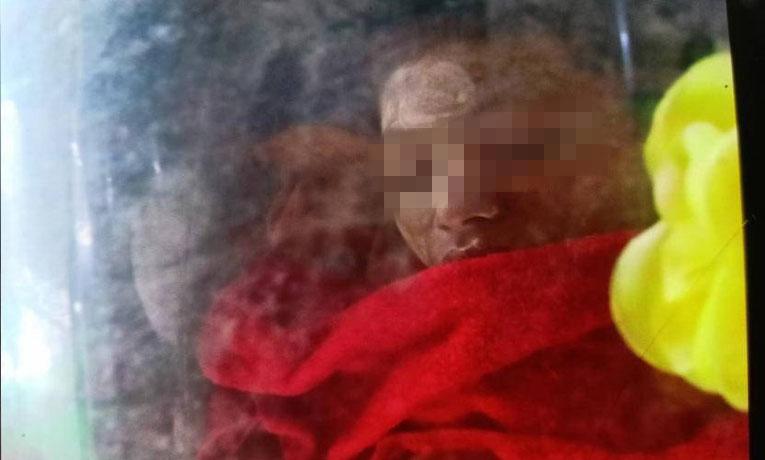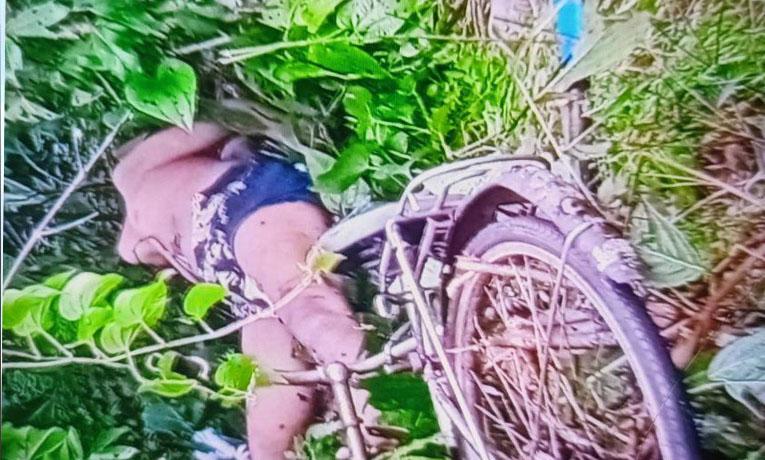This Incident Report describes events that occurred in Kyeh Htoh (Kyaikto) Township, Doo Tha Htoo (Thaton) District, in July 2023. On July 13th 2023, a 13-year-old boy called Maung H--- was injured and died after stepping on a landmine planted by the Pyu Saw Htee armed group, under the authority of State Administration Council (SAC) Light Infantry Battalion (LIB) #207, in a place near N--- village, Ka Ywe village tract. He stepped on the landmine as he was going to look after the cows as they grazed on pastures near the village. He died in the incident place, from the injury, without receiving emergency help as villagers confused the sound of the landmine explosion with the usual mortar shelling sounds heard in the area. His family members found his corpse the next morning and organised the funeral without receiving any support or compensation from the SAC.[1]
Part 1 – Incident Details
|
Type of Incident |
[Landmine explosion] Injuries and death from stepping on a landmine |
|
Date of Incident(s) |
July 13th 2023 |
|
Incident Location (Village, Township and District) |
N--- village, Ka Ywe village tract[2], Kyeh Htoh Township, Doo Tha Htoo District |
|
Victim Information |
|
|
Name |
Maung[3] H--- |
|
Age |
13 years old |
|
Gender |
Man |
|
Ethnicity |
Bamar[4] |
|
Marital Status |
- |
|
Occupation |
Cowboy |
|
Religion |
Buddhist |
|
Position |
Villager |
|
Village |
N--- village, Ka Ywe village tract, Kyeh Htoh Township, Doo Tha Htoo District |
|
Perpetrator Information (Armed Actors) |
||||
|
Name(s) |
Rank |
Unit |
Base |
Commander’s Name |
|
|
|
Pyu Saw Htee[5] group, which is under Light Infantry Battalion (LIB)[6] #207 (under the command of Light Infantry Division (LID)[7] #44) |
This Pyu Saw Htee group is based in N--- village. LIB #207 army camp is in Thein Za Yat Town, Kyeh Htoh Township. |
Pe Thi (Pyu Saw Htee group leader) |
Part 2 - Information Quality
|
1. Explain in detail how you collected this information. |
|
[A KHRG researcher] learned about the incident from the ‘Department of Organising and Information’ in Kyeh Htoh Township [under the Karen National Union (KNU)[8]]. He then conducted more research about this case by getting first-hand information from G---, a person close to the victim [relationship censored for security]. |
|
2. Explain how the source verified this information. |
|
G--- is a person close to the victim [relationship censored for security], Maung H---, and he provided the information to KHRG. He stated that the information he testified was true as he was involved in organising the funeral service for Maung H--- from the beginning to the end. The KHRG researcher also had an informal conversation with another person close to the victim [relationship censored for security] in January 2024 about the landmine incident. |
Part 3 – Complete Description of the Incident
|
Describe the Incident(s) in complete detail. |
|
In the afternoon of July 13th 2023, a landmine exploded near Thein Za Yat Town, Kyeh Htoh Township. Maung H---, who is the son of U W---, from N--- village, Ka Ywe village tract, Kyeh Htoh Township, had left his house at about 2:50 pm that day to go look after the cattle. He stepped on the landmine on his way, and was killed by the explosion.
The victim, Maung H---, was 13 years old. His family has been struggling for their livelihood, working as daily workers and [taking on] any jobs they are offered by other villagers. Therefore, Maung H--- had been working as a cowboy [for a local cow owner] so that his salary could be added in support of his family’s income. The morning before the incident, Maung H--- left his house to look after the [grazing] cows. He returned to his house in the afternoon for lunch and then went back to [look after] the cows by bicycle. On the way, he stepped on a landmine. [Back in N--- village,] a few moments after he left his house, villagers heard the sound of the explosion, but they did not know that it was a landmine explosion [and that it killed Maung H---]. Villagers from N--- village could not identify what type of ammunition [caused the] explosion [based on the sound], because both the State Administration Council (SAC)[9] Artillery Unit #310 and SAC Light Infantry Battalion (LIB) #207 bases are in Thay Za Ya Town, Kyeh Htoh Township, close to their village, and the SAC soldiers often shell mortars [around their army camps]. SAC soldiers have been conducting shelling after losing soldiers on the front line, when they win a fight on the front line, or even when they are drunk. Villagers often hear explosions, so they did not realise that this explosion was from a landmine.
The evening [of the incident], Maung H--- did not return home, so his family looked for him, but they could not find him anywhere in the village. Villagers continued looking for him, and found out the next morning that he died from wounds caused by the landmine explosion, right beside his bicycle, at a place near N--- village.
The Pyu Saw Htee armed group is a local militia led by [the group leader named] Pe Thi, under the command of SAC LIB #207 (which is under SAC Light Infantry Division (LID) #44). This Pyu Saw Htee group is based in N--- village, and its members are hard to identify, as they dress and behave like civilians. They nonetheless often carry guns, work as informants for the SAC, and sometimes even participate in frontline fighting. The Pyu Saw Htee had planted landmines near the village, claiming to do this for the village’s security. No local resistance armed group operates around the place of the incident, so villagers assume that this landmine had been planted by the Pyu Saw Htee. These Pyu Saw Htee soldiers live in the village holding guns, use drugs, and randomly fire their arms. The group is based, lives, and operates in the village and its surrounding area.
The family of Maung H--- has been facing livelihood difficulties and their [income] situation has worsened since he died from stepping on the landmine, but the SAC did not take any responsibility toward the family [no compensation was offered]. Due to the high security risks, neither family members nor villagers felt safe reporting the case to the SAC in the army camps, or to the Pyu Saw Htee group based in the village. The family and the villagers had to hold the funeral quietly [as opposed to the traditional noisy ceremony] in fear and did not even feel safe to take pictures of the victim’s corpse because they [knew that] Pyu Saw Htee members [would be] present at the funeral. A person close to the victim [relationship censored for security] expressed how sad she felt about losing him. [She expressed] that she did not want this kind of incident happening in the community again. |
Part 4 - Permission for Using the Details
|
Did the victim(s) provide permission to use this information? Explain how that permission was provided. |
|
The interviewees gave [KHRG] permission to use this information for publication. |
Further background reading on the situation on landmines in Southeast Burma can be found in the following KHRG reports:
- “Mu Traw District Situation Update: SAC air strikes, arrest of villagers, and indiscriminate shelling causing casualties, and landmine explosion, March 2022 to February 2023”, January 2024
- “Danger Beneath Our Feet - Landmine contamination in Southeast Burma and its impacts on villagers since the 2021 coup”, December 2023
- “Mu Traw District Incident Report: Two villagers injured by landmine explosions”, February 2023
- “Hpa-an District Short Update: Landmine explosions in T’Nay Hsah Township, January to June 2023”, August 2023
KHRG received these photos from a local villager on July 15th 2023. These photos were taken in N--- village, Ka Ywe village tract, Kyeh Htoh Township, Doo Tha Htoo District. These photos show the corpse of Maung H--- who stepped on a landmine on July 13th 2023. The landmine had been planted by Pyu Saw Htee soldiers living in the village. [Photos: Local Villager]
Footnotes:
[1] The present document is based on information received in November 2023. It was provided by a community member in Doo Tha Htoo District who has been trained by KHRG to monitor human rights conditions on the ground. The names of the victims, their photos and the exact locations are censored for security reasons. The parts in square brackets are explanations added by KHRG.
[2] A village tract is an administrative unit of between five and 20 villages in a local area, often centred on a large village.
[3] Maung is a Burmese male honorific title used before a person’s name.
[4] The majority ethnic group in Myanmar, also known as ethnic Burmese or Burman.
[5] The first Pyu Saw Htee groups were officially formed in mid-May 2021 in response to the National Unity Government’s call for the formalisation of a People’s Defence Force to resist the military regime following the 2021 military coup. The Pyu Saw Htee is made up of military veterans and Buddhist ultranationalist pro-military supporters whose aim is to counter and control opposition to the military regime.
[6] A Light Infantry Battalion (LIB) comprises 500 soldiers. Most Light Infantry Battalions in the Tatmadaw are under-strength with less than 200 soldiers, yet up-to-date information regarding the size of battalions is hard to come by, particularly following the signing of the NCA. LIBs are primarily used for offensive operations, but they are sometimes used for garrison duties.
[7] A Light Infantry Division (LID) of the Tatmadaw is commanded by a brigadier general, and consists of ten light infantry battalions specially trained in counter-insurgency, jungle warfare, search and destroy operations against ethnic insurgents . They were first incorporated into the Tatmadaw in 1966. LIDs are organised under three Tactical Operations Commands, commanded by a colonel, three battalions each and one reserve, one field artillery battalion, one armoured squadron and other support units. Each division is directly under the command of the Chief of Staff (Army).
[8] The Karen National Union (KNU) is the main Karen political organisation. It was established in 1947 and has been in conflict with the government since 1949. The KNU wields power across large areas of Southeast Myanmar and has been calling for the creation of a democratic federal system since 1976. Although it signed the Nationwide Ceasefire Agreement in 2015, relations with the government remain tense.
[9] The State Administration Council (SAC) is the executive governing body created in the aftermath of the February 1st 2021 military coup. It was established by Senior General Min Aung Hlaing on February 2nd 2021, and is composed of eight military officers and eight civilians. The chairperson serves as the de facto head of government of Burma/Myanmar and leads the Military Cabinet of Myanmar, the executive branch of the government. Min Aung Hlaing assumed the role of SAC chairperson following the coup.







